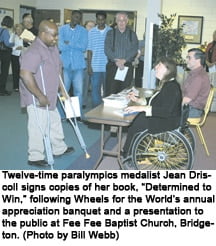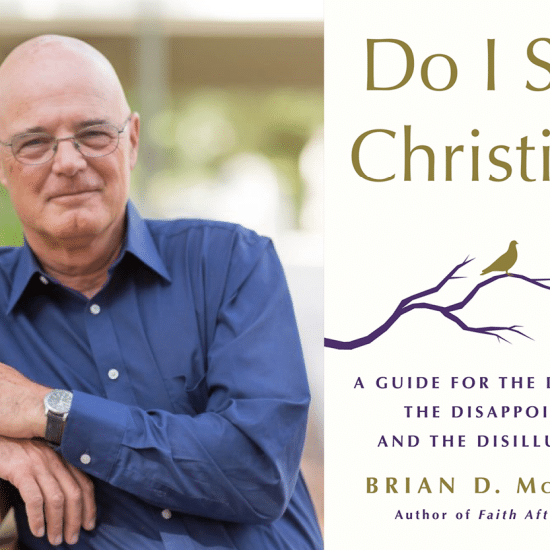By Bill Webb, Word&Way Editor
She was supposed to be the little girl who couldn't do much of anything. Born with spina bifida — her spine was exposed — and a cleft palate.
But a record eight wins in her wheelchair categor y in the Boston Marathon, two silver medals in the Olympics and 12 medals in the Paralympics prove otherwise. Despite physical and attitudinal setbacks in her life, she turned her disability into a challenge.
y in the Boston Marathon, two silver medals in the Olympics and 12 medals in the Paralympics prove otherwise. Despite physical and attitudinal setbacks in her life, she turned her disability into a challenge.
She was named 25th in the top 100 women athletes of the 20th century by "Sports Illustrated for Women" — and she is confined to a wheelchair.
Sitting in her familiar wheelchair on the platform of Fee Fee Baptist Church and representing Joni Eareckson-Tada's Joni & Friends organization, she was present to help honor some 95 volunteers with the Wheels for the World ministry.
Volunteers collect thousands of old wheelchairs, store them, work with several prisons to renovate them to brand new condition, take them overseas and fit them to their new owners. For many, they offer the gift of mobility for the first time. Only recently did the ministry provide wheelchairs in the United States — in the wake of hurricanes Katrina and Rita.
Along the way to coming to grips with her setbacks in life, Jean Driscoll met a University of Illinois athletic director who demonstrated a winsome faith. Today, she is able to explain her accomplishments in light of her faith — "because of the bouquet of opportunities God gave me when I was formed in my mother's womb."
After she was born, "doctors immediately began placing limitations on my life," she said. "I wouldn't be able to walk; I would not be able to go to the school in my neighborhood."
When she was 2, she began to walk with the aid of braces (though she drew the attention of "gawkers"). When she was 18, she moved out of her parents' house. "Man's limitations are God's opportunities," she told the audience, some of them in wheelchairs or with crutches at their side.
Later, an accident left her without the ability to walk.
She experienced depression, wondering why God was picking on her. During high school in Milwaukee, she learned about wheelchair hockey and other sports.
The University of Illinois recruited her for basketball, where a coach challenged her to try a wheelchair marathon. To get him off her back, Driscoll entered and finished well enough to qualify for the Boston Marathon. She won seven titles in a row, setting records in her category in the first five.
"In 1992, I qualified to go to the Olympic Games in Barcelona," she said. She competed in the 800 meters, but that wasn't the highlight of the Games for her.
"I started my Christian walk on the beaches of the Mediterranean Sea," she said. "Jesus had walked on the other side of the Mediterranean Sea."
Today she travels across the United States and to other countries to encourage others with handicaps and to point them to faith in Christ.
She is reminded of her blessings; she always had a wheelchair when she needed one. "But I've met people in Ghana who wear sandals on their hands and have callouses on their knees," she said. "They are deemed to be cursed by God."
That prompted her to raise funds to bring eight Ghanaian wheelchair athletes back to the states to be trained and properly equipped, noting that just because they are handicapped doesn't mean they must live without dignity.
As she closed, Driscoll read a verse from Daniel, which described God's throne as having wheels.
"I'm created in the image of God, and my wheelchair is made in the image of His throne," she said. (10-19-05)






